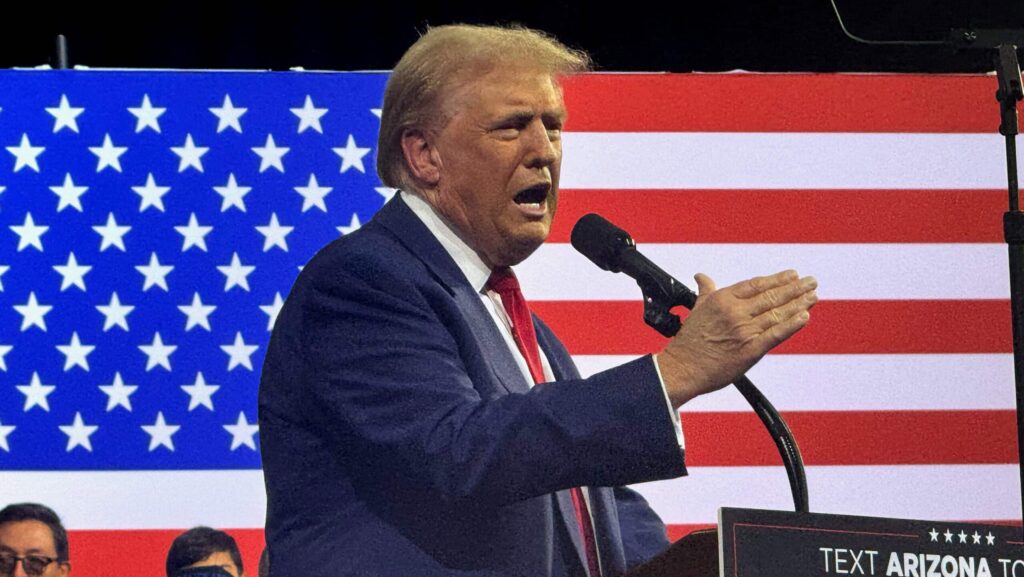Summary:
-
President Trump’s call to revoke CBS’s broadcast license sparks backlash for alleged First Amendment violation. Press freedom advocates condemn the move.
-
Critics argue FCC Chairman would set dangerous precedent by complying with Trump’s request for punitive action. Legal experts warn of authoritarian implications.
-
Trump’s attack on FCC, targeting CBS, is seen as part of a broader strategy to delegitimize media outlets. Free Press denounces move.
President Donald Trump has ignited controversy once again after publicly calling on Federal Communications Commission (FCC) Chairman Brendan Carr to revoke the broadcast license of CBS, following segments aired on 60 Minutes that Trump characterized as “distorted” and “anti-American.”
During remarks issued on Sunday, Trump demanded that Carr “impose the maximum fines and punishment” on the network for its recent coverage, which included a high-profile interview with Ukrainian President Volodymyr Zelenskyy and a separate segment on the political and environmental significance of Greenland — an autonomous Danish territory that Trump has previously suggested the U.S. should attempt to acquire.
Trump’s comments have been widely condemned by press freedom advocates and legal experts as a blatant attack on the First Amendment and a misuse of federal regulatory authority.
Legal and Ethical Boundaries
While the FCC does maintain regulatory control over the issuance and renewal of broadcast licenses, the agency is historically bound by First Amendment protections and avoids making licensing decisions based on the editorial content of broadcasts. Critics of Trump’s request argue that any attempt by Chairman Carr to comply would amount to government censorship, setting a dangerous precedent for media independence in the United States.
“There is no legal basis for this kind of retaliation,” said Jessica J. González, Co-CEO of media watchdog organization Free Press. “Trump is weaponizing the FCC to attack First Amendment freedoms and threaten free speech. Unfortunately, FCC Chairman Carr has been all too happy to comply and has repeatedly abused his licensing authority to punish any broadcaster that critically covers this president and his political agenda.”
González added that she expects Carr may again attempt to justify a punitive response through legal maneuvering, despite the lack of grounds for such action.
ADVERTISEMENT
“We’re now waiting for the other shoe to drop — for Carr to once again twist himself into a legal pretzel to appease his boss and launch yet another blatantly unconstitutional attack on free speech,” she said.
A Pattern of Media Retaliation
Trump’s demand comes just weeks after the FCC reconsidered a previously dismissed complaint brought by a pro-Trump group against local CBS affiliate WCBS-TV. The complaint alleged “news distortion” over the station’s airing of a 60 Minutes interview with then-Vice President Kamala Harris. While such complaints are rarely sustained and must meet strict evidentiary standards, Chairman Carr agreed to revisit the issue — a decision that Free Press characterized as politically motivated.
Media analysts say these moves reflect an ongoing pattern of antagonism toward press institutions that Trump views as oppositional.
“This is about more than one segment or one show,” said Mark Feldstein, a professor of journalism at the University of Maryland. “It’s part of a long-standing strategy to delegitimize media outlets that publish critical coverage. Now it’s crossed into dangerous territory, where the government is being asked to take punitive action against protected speech.”
What Aired on 60 Minutes
The 60 Minutes segments in question have been widely praised for their journalistic depth and global relevance. The interview with President Zelenskyy addressed ongoing U.S. support for Ukraine amid its war with Russia, while the Greenland segment explored the geopolitical, environmental, and Indigenous issues surrounding the Arctic territory — topics that have gained prominence due to climate change and international diplomacy.
Trump reportedly took offense to how his past interest in purchasing Greenland was portrayed in the segment. In 2019, he floated the idea of buying the territory from Denmark, a proposal that was swiftly rejected by Danish officials and met with widespread criticism from international leaders.
ADVERTISEMENT
“The irony in all of this is that 60 Minutes’ supposed crime, in the eyes of Trump, is committing an act of journalism,” said González. “I encourage anyone who watches Sunday’s Zelenskyy interview to see how it meets any of the FCC’s criteria for license denial. It doesn’t.”
Implications for the FCC
Though the FCC operates independently of the executive branch, Trump’s calls to action put Chairman Carr under scrutiny. Carr, a Trump appointee known for his outspoken conservative views, has previously criticized media bias and has been accused by advocacy groups of enabling political interference in regulatory decisions.
Calls are mounting for Carr to reject the former president’s demand and affirm the agency’s commitment to constitutional principles.
“I strongly urge the FCC chairman to stop embarrassing himself, to reject the president’s call to violate his oath of office and the Constitution, and to stand against government censorship,” González stated. “I doubt Carr will.”
Broader Free Speech Concerns
The incident has reignited debates over the fragile balance between media criticism and governmental overreach. While politicians are free to express dissatisfaction with coverage, efforts to leverage regulatory power to punish speech — particularly that of established journalistic institutions — are viewed as contrary to democratic norms.
Legal experts warn that even if Carr declines to act, the rhetoric alone could have a chilling effect on media outlets, especially those operating under FCC oversight.
“Threatening to revoke licenses over news content is not just wrong — it’s authoritarian,” said Nadine Strossen, former president of the ACLU and a constitutional law scholar. “Our democracy depends on a free press. Politicians who can’t take criticism shouldn’t be in positions of power, and regulators who bow to those politicians are failing their public duty.”
For now, CBS has not issued a formal response to Trump’s comments. 60 Minutes continues to air weekly on Sunday evenings and remains one of the most respected investigative news programs in American television history.









